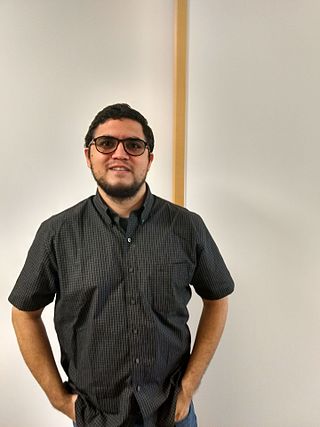
Leopoldo Eduardo López Mendoza is a Venezuelan opposition leader. He co-founded the political party Primero Justicia in 2000 with Julio Borges. López was elected mayor of the Chacao Municipality of Caracas in the regional elections held in July 2000. He is the National Coordinator of another political party, Voluntad Popular, which he founded in 2009.

Censorship in Venezuela refers to all actions which can be considered as suppression in speech in the country. Reporters Without Borders ranked Venezuela 159th out of 180 countries in its World Press Freedom Index 2023 and classified Venezuela's freedom of information in the "very difficult situation" level.

The record of human rights in Venezuela has been criticized by human rights organizations such as Human Rights Watch and Amnesty International. Concerns include attacks against journalists, political persecution, harassment of human rights defenders, poor prison conditions, torture, extrajudicial executions by death squads, and forced disappearances.
María Lourdes Afiuni Mora is a Venezuelan judge. She was head of the 31st Control Court of Caracas before she was arrested in 2009 on charges of corruption after ordering the conditional release on bail of businessman Eligio Cedeño, who then fled the country. She was moved to house arrest in Caracas in February 2011, and granted parole in June 2013, but she is still barred from practicing law, leaving the country, or using her bank account or social networks.
A Lebanese Venezuelan is a Venezuelan citizen of Lebanese origin or descent. There are around 340,000 to 500,000 people of Lebanese ancestry.

Juan Requesens Martínez is a deputy of the Venezuelan National Assembly, elected in 2015 and sworn in on 5 January 2016. He was a student leader at the Central University of Venezuela (UCV), and a leader of student opposition protesters during the 2014 Venezuelan protests. He led marches opposing the Government of Venezuela under President Nicolás Maduro, seeking "to turn the student rebellion into a broader social movement".
Iván Antonio Simonovis Aranguren is a Venezuelan criminal science expert and security consultant, who served as security chief during the Llaguno Overpass events of April 2002 in Caracas.

Foro Penal is a Venezuelan human rights organization that provides legal assistance pro bono to people subject of arbitrary detentions and their relatives. The organization is composed of regional coordinators for each state in Venezuela, pro bono lawyers on a national level and a network of over five thousand volunteers, non-lawyer activists, known as "active defensors".

Juan Requesens, a deputy of the Venezuelan National Assembly, was arrested as a suspect in the Caracas drone attack, an alleged assassination plot on the Venezuelan President Nicolás Maduro. The circumstances of his arrest and detention are controversial, and irregularities surround the legal proceedings. Requesens was imprisoned in El Helicoide from his arrest on 7 August 2018, with allegations of torture to coerce a confession, and delays impeding the legal process and hearings until his release on 28 August 2020.

Edgar José Zambrano Ramírez is a Venezuelan lawyer and politician that currently serves as a National Assembly deputy for the Lara state. From January 5, 2019 to January 5, 2020, he served as First Vice President of the Assembly. He was President of the Permanent Defense and Security Parliamentary Commission between 2016 and 2018. He is the vice president of the opposition political party Democratic Action.

Roberto Eugenio Marrero Borjas is a Venezuelan attorney, politician, and chief of staff to Juan Guaidó; he was arrested by SEBIN during a raid on his home in the early morning hours of 21 March 2019, and detained in El Helicoide, a prison run by SEBIN and "considered the country's largest torture center" according to Clarín. Marrero is also an attorney for Leopoldo López; López is Guaidó's mentor and a political prisoner.
There has been censorship and media control during Venezuelan presidential crisis between 2019 and January 2023.
Gilber Caro is a Venezuelan politician, activist and thrice political prisoner.
Rafael Ramón Acosta Arévalo was a Venezuelan military officer with the rank of corvette captain of the Venezuela Navy. Acosta Arévalo was victim of forced disappearance and tortured by agents of the General Directorate of Military Counterintelligence (DGCIM) during his detention after being accused by the government of Nicolás Maduro of "conspiring to carry out an attempted coup d'état". Acosta Arévalo died as a result of injuries suffered after being tortured while in detention in the Military Hospital of the Army Dr. Vicente Salias Sanoja. The news of his death caused great impact in the media and the condemnation of both national and international authorities.
Carlos Andrés García was a Venezuelan politician who served as councilor of Guasdualito, Apure, and who died while incarcerated by the Bolivarian Intelligence Service (SEBIN).

Alex Nain Saab Morán is a Colombian businessman. Saab was the subject of journalistic investigations for conducting businesses estimated at US$135 million with the Venezuelan government, while other Colombian businessmen had stopped exporting to Venezuela due to uncertainty regarding payments and tight exchange controls. Saab's name has appeared in multiple ICIJ leaks including the Panama Papers, Pandora Papers and the FinCEN Files.
Darvinson Rojas Sánchez is a Venezuelan journalist. Rojas has worked for the Monitor de Víctimas project collecting data about violent attacks, and covered information relating to the COVID-19 pandemic in Venezuela.
Olga Lucila Mata de Gil is a Venezuelan woman detained in April 2022 for recording a humorous video posted on the social network TikTok in which she names arepas after high-ranking government officials.

Luis Carlos Díaz Vázquez is a Venezuelan journalist and cyberactivist. He has worked at the Instituto Radiofónico Fe y Alegría, the Centro Gumilla and newspapers such as El Nacional and Tal Cual, as well as a radio host at Circuito Unión Radio, and served as a member of the editorial board of SIC magazine. Luis Carlos was arbitrarily detained in 2019 by agents of the Bolivarian Intelligence Service (SEBIN) during the nationwide blackouts of that year, being declared by Amnesty International as a prisoner of conscience. He was released the following day with precautionary measures and his case was archived in 2021, suspending such measures.
Enforced disappearances in Venezuela have been characterized by being of short duration, occurring mainly during the administration of Nicolás Maduro. In 2018, there were at least 200 cases of enforced disappearances, and in 2019 at least 524 cases, with an average duration of five days. According to Foro Penal and Robert F. Kennedy Human Rights, the short duration of the disappearances have been intended to avoid the scrutiny that could come with large-scale and long-term detentions. A 2019 report by the Office of the United Nations High Commissioner for Human Rights concluded that enforced disappearances had been used In Venezuela as a method by the government to censor opponents and instill fear. The Venezuelan constitution prohibits enforced disappearance, even in states of emergency.








